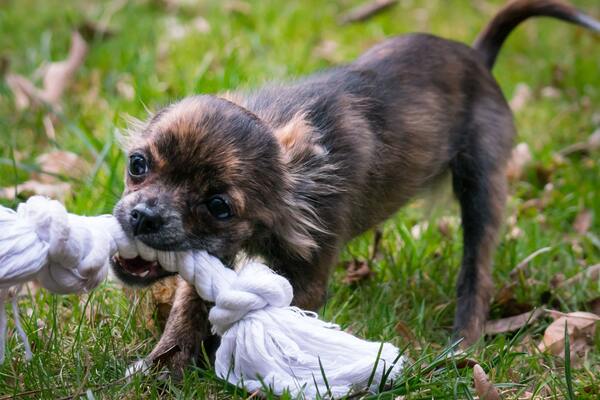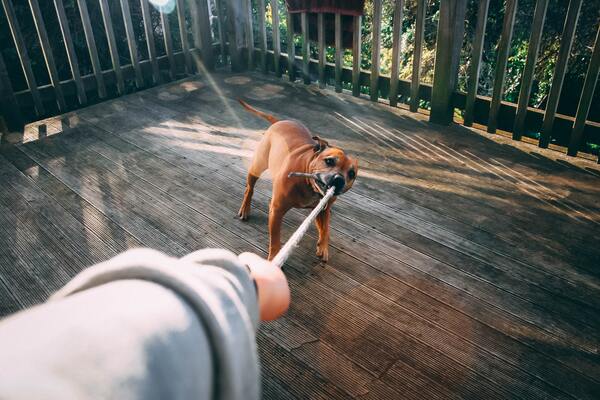A new puppy is like a new family member that has arrived. Despite how adorable they are, they also have a few really annoying characteristics. New puppy owners frequently ask the following queries to dog trainers and behaviorists: “Why does my puppy constantly bite me hard?” If you have an aggressive puppy, there are usually warning signs. Read this article and try to figure out why your puppy always bites you aggressively and what you should do.
Signs Of An Aggressive Puppy
Most of the time, it is normal behavior for puppies to bite or mouth their owners. However, occasionally you might find yourself in possession of a puppy who is acting aggressively.
Poor breeding and genetics, health conditions, or the impact of environmental factors that cause fear, frustration, or anxiety could all be contributing factors.
When they feel uneasy around other dogs or people, puppies who haven’t had enough socialization may also act aggressively.
Signs That Are Confused With Aggressive Puppy Behavior
Here are some descriptions of typical canine puppy play interactions for comparison’s sake:
- Chasing one another
- Jumping on one another
- Pinning another puppy to the ground and standing over him
- Biting or chewing on another puppy’s ears and muzzle
- Biting or chewing on another puppy’s feet and tail
- Snarling and growling
- Snapping jaws
- Barking
Reasons For Aggressive Puppy Biting
There are a number of factors, in addition, to play biting getting out of control, that may be at play when a puppy actually bites out of aggression.
You might also notice growling, snapping, and aggressive body language in these types of aggression. A few of the more typical causes are:

Resource Guarding
Puppies may guard important objects, such as toys, bones, their food or water bowls, or doors and windows. Only other animals or humans living in the same house may be victimized by them.
Resource guarding is a deeply ingrained behavior that is made worse by anxiety and fear. Meeting the parents of a potential puppy is crucial because it can occasionally be genetically inherited.
Punishment and improper handling of puppies can exacerbate resource guarding as well.
Fear Aggression
Puppies who fear aggression typically develop this behavior as a result of poor socialization, a genetic predisposition passed down from one or both parents, and/or a single, traumatic event when they were young.
They can develop anxiety and fear if new things, such as other dogs, people, places, and noises, are not properly introduced to them. Due to their fear and desire for the source of their fear to disappear, these puppies will display aggression in a defensive stance.
Territorial Behavior
Territorial behavior in puppies is also a result of inadequate socialization. In breeds bred for guarding and protective instincts, it might also happen naturally.
Congenital Behavior
A puppy’s parents may pass on their aggressive nature to the pup. This can occasionally be changed through socialization, behavior modification, and obedience training. In some cases, a trained behavior consultant or veterinary behaviorist should be consulted.
How To Teach My Puppy To Stop Biting Aggressively
Bite Inhibition
Puppies in a pack naturally pick up bite inhibition through play. The other pup yelps and they realize they bit too hard. Allowing him to bite you will make him act in the same manner. Make your hand limp and yell in a high pitch when he starts to chomp down too hard.
Play Time
Avoid being too rough when playing with your puppy because this could lead to biting. While the tug of war and gentle wrestling matches can be entertaining, watch out for overstimulating your puppy.
Redirect
Planning must go into redirection. Remove your hand from your dog’s mouth if he tries to bite you. You don’t want to see your puppy nipping at your skin. Give him a treat or a toy right away to divert his attention. If your dog is an aggressive chewer, this is a particularly effective strategy.
Distraction
Your dog will have something to chew on if you choose the right toys. This is a good place to use a toy with a treat hidden inside. Select toys that will challenge your dog’s brain as well. Your dog’s ability to channel her energy in a constructive manner can be greatly aided by mental stimulation.
Socialization
Your dog will benefit from being socialized if you set up a play date for him. The other dogs will soon teach your puppy when they’re biting too firmly.
Deterrence
In order to stop your dog from chewing, you can also find products that taste awful. Give them a cotton puff containing a small amount of the product. They’ll expel it and give it a sniff. Apply the product to the objects you don’t want him to bite now.
Some Extra Help Training Your Dog
The three very easy methods listed below are an excellent resource from trainer Zak George for getting your puppy to stop biting you aggressively.
How To Train An Aggressive Puppy
Here are some training suggestions for your puppy that will stop the cycle of aggression in addition to controlling the circumstances and settings in which it typically occurs.
- Get used to handling, cuddling, and petting your puppy without provoking rough play or chewing at first.
- Instill bite inhibition in your puppy. This is the process of discovering when a bite is too powerful or is no longer enjoyable for both parties. Although puppies learn bite inhibition from their mothers early on, there are methods you can learn to train this behavior. View the links at the article’s conclusion.
- Teach your puppy to “leave it” so you can signal him to stop biting, chewing, or pulling at your shoes, clothing, leash, or other dogs or people.
What If My Puppy Continues To Bite
It will take time for your dog to adjust to the situation. He might need a few days or even a few weeks to catch on. Over that time, you should notice some kind of development.
It’s worth having him evaluated by a qualified trainer if he’s not making any progress at all or if the behavior starts to get worse.
If there are underlying issues of fear or aggression, a qualified dog trainer can determine them. They can also suggest alternative training methods for you.
You might also find some comfort in advanced puppy training classes.
You may want to know why your puppy always licks you.





